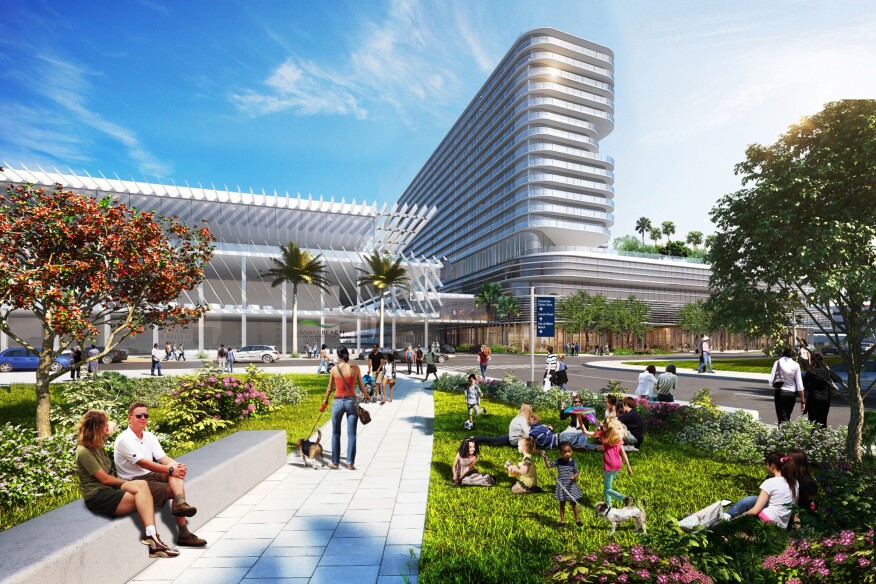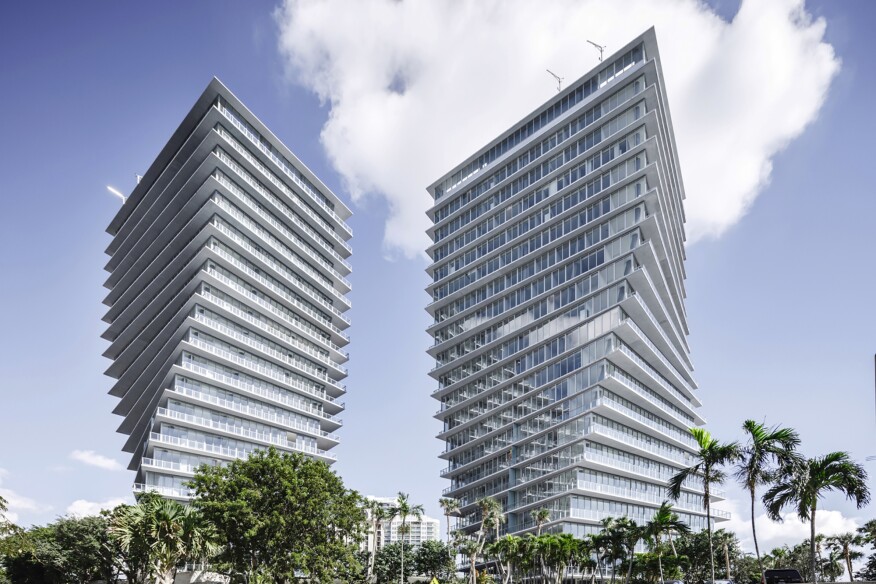With an eye toward sustainability, the developer is transforming South Florida’s built environment, one parcel at a time.
As the CEO of Terra, the Miami-based development firm he co-founded with his father Pedro some 20 years ago, David Martin has teamed up with the likes of Rem Koolhaas, Hon. FAIA, and Renzo Piano, Hon. FAIA, to dream up everything from luxury condos and hotels to multifamily apartments and retail spaces. Here, the Florida native reflects on his practice and building for the future.
What led to the founding of your firm?
My father, Pedro Martin, and I co-founded Terra when I was 23 years old, so I’ve been involved in real estate development my entire career. The firm has been among South Florida’s most active developers over the past 20-plus years, but we’re also one of the market’s most diverse, responsible, and thoughtful firms. We create communities for people, with an emphasis on long-term sustainability.
What’s the best way to describe the personality of your practice?
Terra is a community builder and innovator. As a firm, our mission is to transform neighborhoods and the way we live through considered, intelligent, and unexpected design. For Terra, transformation is not simply change for change’s sake. It is the thoughtful evolution of a place to help it reach future goals more efficiently and more sustainably so that progress becomes part of the ongoing neighborhood dynamic.
 Terra
Terra Terra
TerraDevelopment—executed thoughtfully and responsibly—can breathe new life into a community and change a neighborhood for generations. Terra looks for places where we can have an impact, from the standpoint of design, the local economy, urban planning, and sustainability.
Terra has always believed in a “less is more” approach by prioritizing scale and density over profit. We are always seeking ways to further the enhancement of both public and private space. Even when projects are zoned and approved for much larger-scale development, we take into consideration the impact a maximum-sized property will have on the surrounding community.
When development threatens to overshadow or negatively augment a neighborhood’s atmosphere, we prefer to follow a right-sized approach, which may mean lower density, a smaller footprint, or more preservation of existing green space and natural resources, rather than pursuing the highest-possible profit. [This] allows for progress that is balanced against the goal of strengthening, rather than replacing, neighborhoods.
We are spearheading projects that are confronting some of the most pressing challenges our region faces, from transit and mobility to affordability and climate resiliency. We excel at unlocking private-sector solutions to community-wide challenges, and we are community builders driving the growth of emerging neighborhoods in a sustainable manner.
What project of yours best illustrates that approach?
Terra’s impact in the community has become another of the firm’s trademarks. We focus on upgrading communities by improving their infrastructure, incorporating green spaces, and implementing well thought-out amenities. We develop properties that serve as catalysts for their given areas and inspire future growth.
The firm is about to deliver one of South Florida’s largest transit-oriented developments—Grove Central, a mixed-use community that sits on 5 acres of land across from Miami-Dade County’s Metrorail and is linked to the Underline linear park.
Development impact fees for our Park Grove development in Coconut Grove created funds for the city of Miami to create Regatta Park along the Biscayne Bay waterfront. For decades, the space had been previously underutilized by a small, outdated convention center, and little to no shoreline access for the public. The new Regatta Park contains multiple walking and bike paths, ample outdoor seating and shade, picnic areas, open play space, and a public boat ramp.
Canopy Park, Miami Beach’s new three-acre community park, is adjacent to our Five Park development. It was designed with sustainability in mind and reflects how landscape architecture can serve as a green resiliency solution for coastal communities. Once Five Park delivers, Canopy Park will connect to Miami Beach’s popular South of Fifth neighborhood and complete the Miami Beach Baywalk via a new signature pedestrian bridge.
In West Miami, we are creating housing affordability through infill development. We’re developing two large master planned developments: CentroCity, a 38-acre mixed-use project now under construction with residential, retail uses, and a charter school; and we’re planning to break ground later this year on Upland Park, a mixed-use community that will transform Miami-Dade County’s Dolphin Park and Ride Station in West Miami-Dade into a 47-acre multimodal transit hub with residential, retail, office, and hospitality uses. We also recently completed a new multifamily community called Natura Gardens with 460 garden-style rental apartments, now welcoming tenants.

What projects are you most drawn to?
We see a need and we fill a void—our portfolio of current and upcoming developments includes market-rate apartments, lifestyle retail centers, single-family-home communities, high-end condominiums, industrial, and Class A office space across South Florida. Our successful track record has enabled us to secure financing during a challenging economic landscape and helped us continue building to meet market demand as South Florida welcomes new people and businesses.
Beyond that, one of my main objectives when repositioning Terra as a multifaceted developer was to help elevate Miami’s brand as a global design capital through working with the world’s most acclaimed architects, transforming communities by listening to what neighbors want, and then executing innovative design and intelligent planning.
Terra was one of the first developers to embrace the importance of design, both as a value creator for residents and as a method for coalescing community support. We have an extensive track record of working with noteworthy international designers, as well as local firms that comprehend the South Florida landscape—from Bjarke Ingels, Hon. FAIA, Renzo Piano, and Rem Koolhaas, to Gabellini Sheppard, Meyer Davis, and Yabu Pushelberg, to name a few. We lean into sustainability, working with consultants to create projects that last—such as Walter Meyer, West 8, ArquitectonicaGEO, Spinnaker, and others.
What was your most rewarding collaboration?
Nasir Kassamali, the co-founder of award-winning furniture showroom Luminaire, was a key collaborator in the design and marketing of Grove at Grand Bay. He introduced to me the concept of total design and shared a wealth of knowledge that would shape the entire development process.
Nasir carefully analyzed marketing psychographics for Grove at Grand Bay and determined that the property’s ultimate success would be in becoming an exclusive address for people who appreciate leading-edge architecture and design.
It was that observation that led to the relationship with Bjarke Ingels, an international design superstar. Together, Bjarke, Nasir, and our team agreed Grove at Grand Bay needed to be monumental, the landmark that would re-energize Coconut Grove for the next generation. Bjarke came to Miami in February 2012 and presented his idea for two twisting structures that appeared to lean at 38-degree angles, quite unlike any of the rigid rectangular forms so dominant in traditional architecture and destined to become a defining architectural destination for Coconut Grove.
 Terra | Five Park Miami Beach
Terra | Five Park Miami BeachThe United Nations Secretariat building in New York.
What is the greatest challenge facing developers and designers today?
Building for the future—engaging with the communities you are building in and ensuring you are bringing solutions to these neighborhoods rather than just building residences. At Terra, we’ve incorporated resiliency into every facet of the decision-making process—from site selection, planning, and design that considers long-term climate risks to the use of sustainable building materials, water conservation, and renewable energy.
We have long believed that smart and sustainable development can be an integral part of confronting the impacts of climate change. Making our communities more resilient will take investment, political resolve, and public advocacy.
 Terra | Grand Hyatt Miami Beach.
Terra | Grand Hyatt Miami Beach.I would’ve enjoyed being a scientist. I’m passionate about researching and finding solutions.
What is your favorite building?
This is like asking me to choose my favorite child! I’m 100% engaged in all of my projects and they are all special to me because of the different collaborations and characters that distinguish them. But if I had to choose only one, I would say Grove at Grand Bay. It was a special building at a special time.
What does design misery mean?
Not delivering the design intent.
What does design happiness mean?
Delivering the design intent.
 Rasmus Hjortshoj | Grove at Grand Bay.
Rasmus Hjortshoj | Grove at Grand Bay.Which artists do you most admire?
Nasir Kassamali, he inspired me to create environments that enhance people’s lives. To understand how Terra might integrate design innovation as part of the company’s mission.
Which book(s) are you currently reading?
Malcolm Gladwell’s Outliers: The Story of Success and Good is the New Cool: Market Like You Give a Damn, by Afdhel Aziz and Bobby Jones.
 Terra | Villa Miami
Terra | Villa MiamiI’m a strong believer in bringing great thinkers and experts to our state and cities that help guide us in the direction that will provide a better living experience and enhance our communities. A lot of people have different opinions about what makes a better city and what makes a great city—and I think getting opinions and ideas in an organized format is something that I enjoy as a leader and makes what we do as a firm special and unique.
What’s the one question you wish we had asked (and the answer to that question)?
How can development be a solution to the problems communities are facing today? I want to build neighborhoods and hack capitalism to solve issues our society is facing today. I learned to focus on neighborhoods with high barriers to entry with a ‘less is more’ approach. Research what a community needs and work with the government and residents to bring to the community solutions and truly engage with the people that live there.
 Terra | The Well Bay Harbor Islands.
Terra | The Well Bay Harbor Islands.
 Terra | Mary Street office tower.
Terra | Mary Street office tower.


